#Jacobites
Explore tagged Tumblr posts
Text
#OnThisDay 16 Apr 1746, Culloden became the final chapter of the Jacobite Rising. It was over in under an hour, but the consequences would stretch far beyond the battlefield.
On the moor that day, it wasn’t simply Scotland against England—as often believed—but a brutal reckoning between rival loyalties, with Scots fighting on both sides.
The government line held firm. The Highland charge broke.
What followed wasn’t just defeat—it was erasure: of language, dress, and identity. Culloden didn’t just end a rising. It rewrote a nation.
scotland.co
#scotland#scottish#travel#scenery#landscape#nature#travel inspiration#scottish highlands#landscape photography#culloden#jacobites#battle of culloden
402 notes
·
View notes
Text

April 16th 1746 saw the Battle of Culloden.
Much has been said about the site of the battle and the Prince has been criticised for “choosing” the moor.
Three sites were scouted in the 48 hours leading up to the battle, they knew Cumberland’s army was coming, their had been skirmishes in the week or so before this day, things were coming to a head.
The first site as at Dalcross Castle, which John Sullivan, the Irish adjutant and quartermaster general, rejected, because the distance across the ravine would have been too small to protect the Jacobite army from British musket fire from the other side.
The second was on the south side of the Nairn, chosen by Lord George Murray. This was poor ground, did not protect the road to Inverness and was vulnerable to British mortar fire from the other side of the river. It is clear that this site was a prelude to retreat and the dissolution of the army, because it was not an effective battle site.
The third site was about 1km east of where the battle was eventually fought, and John Sullivan drew up the army there on 15 April. It was on higher and less boggy ground than the final battlefield, and both wings of the army could see each other, which they could not in the next day’s sleet and rain. No one ‘chose’ the site of the battle on Drummossie Moor as a preference: it was the line closest to headquarters at Culloden House which could defend the road to Inverness.
Many of those soldiers who were asleep after the failed night attack on the 15th had retreated to the grounds of Culloden House, and there was little time to form them up as the British Army approached on the morning of the battle.
Some had urged the Prince to fall back into the hills and glens, split into units and launch a guerrilla campaign, historians can’t agree who ruled this out, some say Lord Murray, others Prince Charles, some a mixture of the two, no matter what it never happened, as we all know.
The battle began around before mid-day, the 9,000 well-rested Government troops advanced downwind across the Moor towards their exhausted opponents who faced directly into the north-east wind and its accompanying sleet. The Prince’s forces numbered about 6,000 and were in two lines. The left flank of the front line was held by the three regiments of MacDonalds, highly resentful that they were not in their traditional place of honour on the right, held by the Atholl Brigade.
In the centre were some of the best of the Jacobite infantry, veterans of the victories at Prestonpans and Falkirk: Lord Lovat’s Frasers, the MacLeans, Mackintoshes, McLachlans and Chisholms. Weak in artillery, the Jacobite frontline could see Cumberland’s gunners unlimbering and loading their batteries of cannon. Receiving no order to unleash the fearsome Highland charge, by far their best weapon, they must have known what was coming.
And come it did; Cumberland opened fire with roundshot across the unobstructed moorland. Behind his artillery, the Duke’s own front line consisted of six regular infantry battalions; the Royal Regiment on the right, opposite the MacDonalds, with Barrell’s Regiment on the left, facing the Athollmen. The second line contained six more infantry battalions, with yet three more in a third line alongside two squadrons of light cavalry. Out on his flanks were the feared heavy Dragoons: Cobham’s on the right, Kerr’s on the left. All was ready for the Jacobite charge.
Cumberland’s infantry had been given intensive training on how to deal with the onrushing Highlander, claymore in right hand, targe on his left. Having fired his Brown Bess musket, each man was to use his socketed bayonet to attack the opponent on his right front, trusting that his own comrade to his immediate left would do the same.
This was designed to avoid the parrying effect of the targe and inflict a disabling wound in the first shock of contact.
For a full half-hour the Government artillery thundered on unchallenged, roundshot and then grapeshot hammering into the Prince’s waiting battalions. Still no order to charge came as scores of men went down, thinning the ranks and producing frantic calls from officers and men to be released to the charge. Eventually they went off anyway.
The MacDonalds crashed in to Barrell’s Regiment, overrunning the front line before losing momentum and being shot and bayoneted by the upcoming second rank. Elsewhere the charge was even less successful; depleted by cannon fire and decimated by the rolling volleys of the infantry, Highland courage and dash proved no match for regular infantry discipline. The charge reeled backwards leaving up to a thousand dead in front of and among the Government positions.
Cumberland ordered a general advance and unleashed his cavalry. What had been a battle was now a rout. It had lasted an hour.
Jacobite casualties are estimated at 1,500 dead, with an unknown number of wounded and fugitives bayoneted and shot in the merciless pursuit that followed.Cumberland lost only 59 dead and 250 wounded, the only senior officer to die being Lord Robert Kerr, commander of grenadiers in Barrell’s Regiment and a son of the Marquess of Lothian.
It was over; the military neutralisation of the Highlands was about to begin.
The ease in which the Government troops surprised Cumberland, and he surprised further when the Jacobites did not regroup and force another battle, he certainly expected another, but none came, around 1000 gathered the following day at Ruthven Barracks, where a written order from Prince Charles told them to “seek their own safety” and disband. But, for many, surrendering was too dangerous an option.
As time went on, the risks of Jacobites handing themselves in became clear. The mood of the Ruthven meetings was downcast. Many fought on to avoid capture or because the risk of surrendering was high. In June, a number of Jacobites went into Fort William after the British government promised six weeks’ immunity. Captain Scott drowned them in a salmon net.
Jacobites engaged in low-level disruption, raiding and protection of vulnerable tenantry as well as recruitment to the Irish Brigade and probably Scottish regiments in French service, including Ecossais Royales.
Assassinations of unpopular government officers or sympathisers were also recorded. The British government still considered the Jacobite threat to be “major” at this time with around 12,000 to 13,000 soldiers deployed across the entire country – from Berwick and Stranraer to Elgin, Forres, Stonehaven, Inverbervie and Montrose – by the end of August 1746.
As government forces mobilised, significant units of armed Jacobites continued to appear in the field. At the end of April, 120 armed MacGregor men were recorded in Balqhuidder after marching home ‘colours flying and pipes playing’ with the Army unwilling to tackle or pursue Jacobite units that maintained discipline.
One battalion of Lochiel’s regiment was still operational in May – as were 500 men under Clanranald. Orkney remained under Jacobite control until late that month and, despite British attacks, four local Jacobite lairds remained successfully hidden
Clans made concerted attempts to resist Cumberland and his men with around a dozen chiefs meeting at Mortlaig in early May. At the meeting… they entered into a bond for their mutual defence and agreed never to lay down their arms, or make a general peace without the consent of the whole,” according to an 1832 account by James Browne.
“By the bond of association, the chiefs agreed…to raise on behalf of the prince and in defence of their country, as many able-bodied armed men as they could on their respective properties.”
Around 600 men gathered later that month across the north and west but the clans “ultimately did not have the time or morale to raise or retain enough men in the field.
Although a unified response failed to materialise, Jacobites remained active across Scotland. Jacobite expresses – the non-stop delivery of letters by horse – continued until August. A British regiment was deployed across Banffshire in the summer of 1746 with insurgents reported in Argyll that September.
Arms were surrendered in the Mearns right into the summer of 1748. British atrocities were carried out against innocent victims, but there were plenty of continuing Jacobite threats and remained so for some time, this led to the building of roads and bridges, to make it easier for troops to be deployed into the heart of the country, many still used to this day, these projects and the act of proscription meant the end of the old Highland way of life.
Many of us have made our pilgrimages to Culloden to pay our respects to those that died that day, and to the commemorations, both on the day, and at the one at midnight the night before, I hope you all take a moment and remember the brave men who fell that day and afterwards…………
36 notes
·
View notes
Text
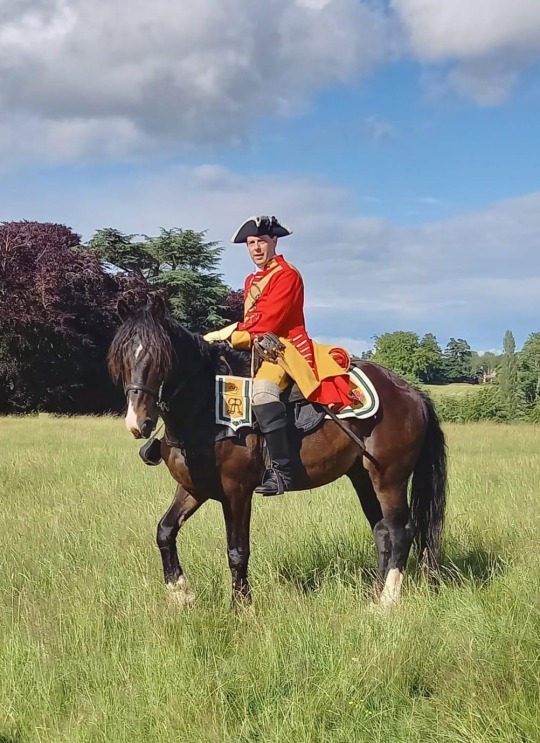
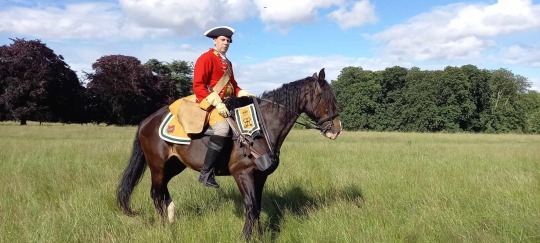

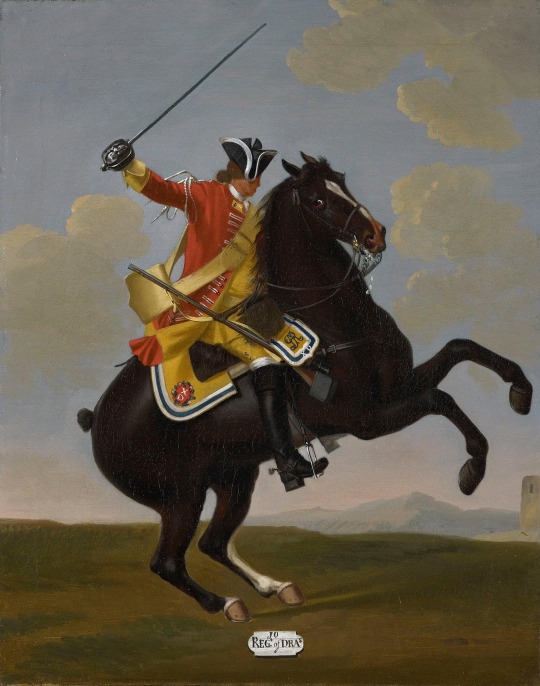
A recreated trooper of Cobham’s Dragoons as he would have looked during the 1745 Jacobite Rising.
#history#british army#military history#18th century#redcoat#dragoon#dragoons#the 45#1745#Jacobite#Jacobites#Jacobite rising
123 notes
·
View notes
Text

Jacobites - Hearts Are Like Flowers
It's December — scarf season! And that means it's time to listen to the Scarf Kings Nikki Sudden and Dave Kusworth. Thanks to americanslimeweasel for digitizing a rare cassette to give all of us our necessary Jacobites fix. Side A captures a loose and lovely Italian radio broadcast in 1985, with Epic Soundtracks along for the ride; Epic sounds like he's hitting ... a phonebook with chopsticks? Side B lets us eavesdrop on an even looser/even lovelier rehearsal from that same year. Neil Young may have named an album Ragged Glory, but these guys are the ones who lived raggedly and gloriously.
Also included with the DL — a scan of a very detailed, very entertaining tour zine from '85. A sampling from the Cologne show: "This was probably the funniest gig. Beer and bottles of wine on stage. The wine got kicked over. The beer got drunk. Feedback from Nikki's acoustic guitar. Lots of animation. Nikki ran around the stage with his guitar unplugged. I was too shy to go on stage. Nikki broke guitar strings. With the help of my technical consultant Briggi we changed strings and tuned the guitar. Nikki plays the newly tuned guitar. It is totally out of tune. He uses another instrument which refuses to work for the next 3 songs. Sometimes the newly formed band even knew what songs they were playing. Sometimes it didn't matter."
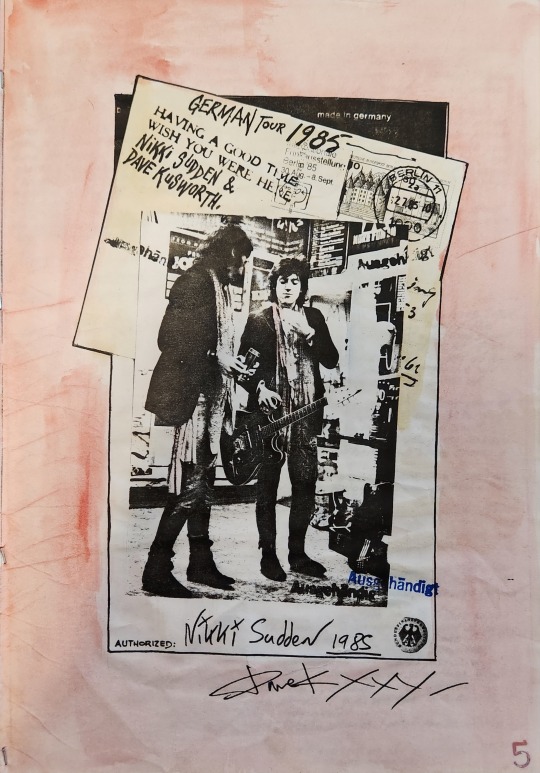
33 notes
·
View notes
Text
It's the first time in a few insanely convoluted, stressful weeks that I have some leisure to engage in reading again, and what is the first thing I stumble upon? One of the absolutely most insane couple of stanzas from a Jacobite poem including not one, but three alleged affairs between the Earl of Shrewsbury and Queen Mary II, the future Queen Anne and a bishop and King William III and Hans Willem Bentinck. ...And did I mention the mpreg.
In a Court full of vice may Shrewsbury lay Molly on, Whilst Nanny enjoys her episcopal stallion And Billy with Benting does play the Italian We beseech thee to hear us ’Mist such blessed pairs, succession prevails, and if Nan of Denmark or Dutch Molly fails May pregnant Mynheer spawn a true Prince of Wales We beseech thee to hear us.
From: A Litany for the Reducing of Ireland, in Cameron, Poems on Affairs of State, p. 219–22, p. 221.
It becomes ever more clear to me as to why Bentinck (a man who had had two wives, 10 children and was very vocal about what he thought of male same sex relations in his letters to William), at the height of those Jacobite publications, wanted some space from the court.
I first encountered this excerpt from a much longer poem in an article called From the Body of the King to the Body of the Nation: Sovereignty, Sodomy, and the English Revolution of 1688, published last year in the journal Modern Intellectiual History, and can be read here for free.
While certainly an interesting read, I am always a bit saddened that all discussions of the relationship between Hans Willem Bentinck and William III tend to inevitably circle back to, or at least imply, the old dispute as to whether there was or wasn't a romantic or sexual relationship between the two, when ample contemporary evidence, including personal letters, makes it clear there was with all the likelihood we can ascertain today, none. Instead, it would be interesting to for once see someone examine their close relationship, which doesn't want to fit into any one mould, apart from the allegations of a sexual affair, which only ever crops up in negative contemporarily, and in highly political contexts. There seems to have been a wealth of trust and nuance as to how they viewed each other that is visible in their letters, which sadly is hardly ever being addressed, even today.
Still, this was another one of these cases where the past surprises - indeed, I know I should know better. People have always been people, but I certainly was not expecting... this.
As another amusing side note, in another Jacobite poem, William III is described as having "the head of a goose", and... this time, I have to say I see what the Jacobites are seeing:
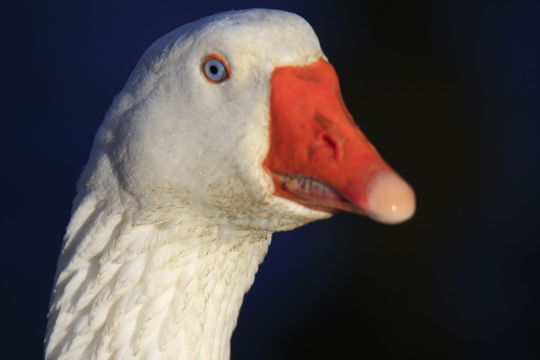

Same glaring stare, same Nose. Will both hiss at and bite you, probably (goose picture bravely taken by Wikipedia user Assianir, who hopefully still has all their fingers attached to their hands).
#history humour#sort of#or rather#historical humour#jacobites#broadsides#17th century#history#tw homophobia#historically#william III of england#william of orange#hans willem bentinck#satires
18 notes
·
View notes
Text
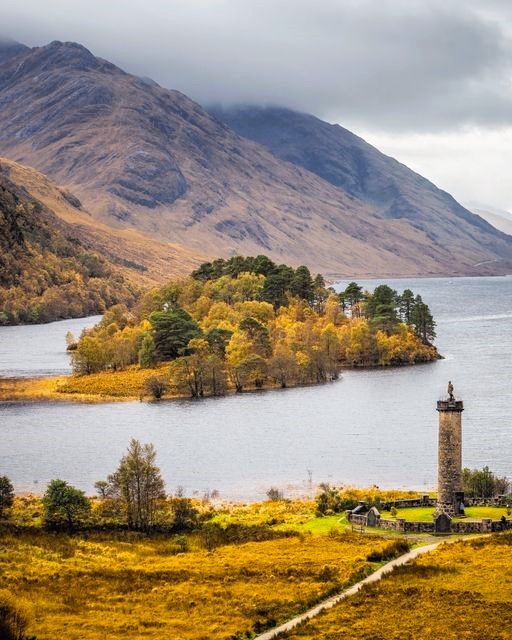
Loch-Shiel
#Glenfinnan#Loch Shiel#Scottish Highlands#Scotland#UK#autumn#West Coast railway#Jacobites#scenery#monument#1745 uprising#Charles Stuart#Prince Charlie#Scottish history
41 notes
·
View notes
Text
JAMMF, 303
James Alexander Malcolm Mackenzie Fraser is today 303. Born to both strife and greatness, on Beltane Day.
Fictional characters never die for good, their energy keeps on lingering somewhere, in a corner of our heart. So, here's a heartfelt Happy Birthday to a formidable character that one day chose to possess Herself's imagination and brought us all together, in this strange digital limbo of sorts.
Despite his rock-solid appearance, JAMMF is a real chameleon. My favorite JAMMF is perhaps the least talked about one. The Diplomat. Of course.
This guy, playing chess at Versailles (in reality, it's Prague, and a sizably different kind of Baroque, but let's not nitpick, here). A wonderful metaphor for what diplomacy was, is and always will be: a sophisticated game of chess.
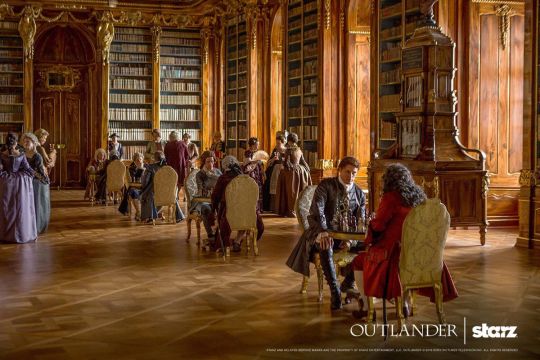
While in Paris, JAMMF is acting, in plain sight, as a diplomatic agent of sorts on behalf of Bonnie Prince Charlie's embryo of a government in exile. Desperately hoping and fruitlessly waiting for more. And making a very bad, emotional job of it all, when emotions are least needed, despite all those best laid plans. Still, he does exactly what a diplomat posted abroad would do. He meets all the important honchos, he brilliantly entertains all those people at his open table, he mingles with princes and beggars alike and of course, he dutifully reports in writing about all this, back to Scotland.
It is, therefore, a pity and a shame that Herself did not utter a single word, in Dragonfly in Amber, about the real Jacobite meeting place in Paris: Sorbonne's Collegium Scoticum/Scots College, or Collège des Écossais, founded in 1333, by an edict of the Parliament of Paris (what we would call today the local council) and as a belated, yet important consequence of the Auld Alliance treaty between France, Scotland and Norway:
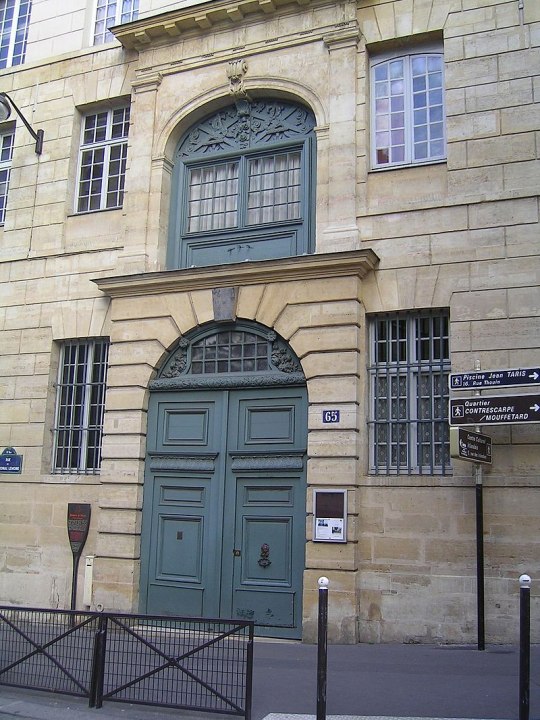
This is a place with a rich and minutely documented history, so much so that the adjoining street soon came to be known as the rue des Ecossais (Scots' Street), instead of rue des Amandiers (Almond Tree Street).
The building is still there, albeit with a different destination, a private Catholic elementary school. And a plaque inside the main building tells part of the story, in Latin:
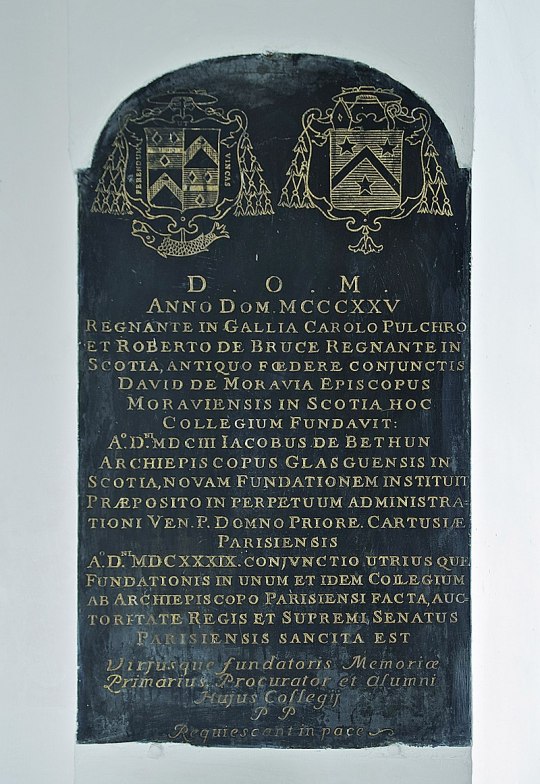
Meaning:
In 1325, under the reigns of Charles the Fair, in France and Robert the Bruce, in Scotland, David de Moravia, bishop of Murray founded this college. In 1604, Jacques de Bethun, archbishop of Glasgow made a seminary out of it, given to the perpetual administration of the Carthusian Order's Superior of Paris [later edit, forgot to translate that properly and the French version I eventually took out is incomplete, sorry!]. In 1639, the whole was placed under the authority of the King of France and the Archbishop of Paris, their supreme authority being solemnly ratified by the Parliament of Paris. In memory of the founders, the priests and the alumni, may they rest in peace!
[Later edit]: the eight year difference in records reflects the time it took for the Parliament of Paris to acknowledge the College's existence and offer its due legal protection. So: founded by the bishop of Murray in 1325 and legally authorized by the Parliament of Paris in 1333. Both dates are legit founding landmarks and can be quoted accordingly.
64 notes
·
View notes
Text


muahaha more jamies
8 notes
·
View notes
Text
Listed: Zak Boerger & Karen Schoemer on Nikki Sudden

Zak Boerger and Karen Schoemer came to Dusted via their late 2024 duo collaboration Days for Nights, a layered fuzz-haze dream of poetry and blues licks that was not so different from Schoemer's work in Sky Furrows, but not the same either. In the review, Dusted noted that, "Together they accomplish a remarkable synergy, the eerie elusiveness of Schoemer’s words merging with the overtone-hazed atmospherics of Boerger’s playing."
But while we met them this way, the two artists met through a shared love of Nikki Sudden, the unruly poet of Swell Maps. Schoemer wrote the liner notes for Sudden's Texas reissue, and Boerger got in touch to talk about it. That blossomed into friendship and, eventually, collaboration. To celebrate their partnership, Boerger and Schoemer contributed a two-part Sudden-themed essay, not strictly speaking a Listed, but close enough.
Zak Boerger
There was no samurai or lover. No woodcutter or priest. It happened in Ted Stevens’ tubes. (He’s right, you know, for all the laughter, much of our digital business is in those tubes. Laugh all you want; old Ted doesn’t care.)
It happened in 2009. Maybe ’08. But not ’10. The desk I sat at and sit at was in storage then. It took a year to get it out, further south, along with 45 or so boxes of a life’s holdings.
As with many things since I saw the cover of Collision Time Revisited in 1989, or maybe 1990, at Sam’s Jams in Ferndale (where I saw so many flat but powerful things) it had something to do with Nikki Sudden (“which one is she?”). And a quote from Thurston Moore, already on the way out for me, a jerk who insists Sister was the last great SY LP.
The liner notes weren’t entirely about Nikki, and I liked that. The person writing them got what should be obvious: this was Epic’s record, musically. The Like Flies on Sherbert reverb, introduced to the Mary Chain by the same record collection. Mostly noise played slowly, or lazily, maybe, is a better description. Like it had nowhere to be particularly. No where. Nowhere. Here. In the grooves of Texas, Groove still a few years out (but the first one I bought by Nikki, without his Swell Maps or Jacobites).
Karen’s liners, for a reissue of Texas and Dead Men Don’t Tell No Tales. Two creatures of Creation. They were about change and aging, wearing down. Getting older. And about how Nikki stayed the same by changing. New scarves. New girlfriends. New tours. Staving off “older” year in and year out.
Karen’s liners were about Epic Soundtracks — what a name, that — his since what, 1972? 1973? Great names those Maps had. Great songs, too. So many of them. And compilations — too many. Two “real” records, compilations like kudzu. I stopped buying after a while. I had enough. No need for version 23 of… car, midget, big maz.
Epic, who I interviewed in 1993. Who teased me from Minneapolis’ Uptown stage in 1994 on my interviewing skills. “Even less together than me.” A sweetheart. A hero.
Those liners started a friendship, that saw one child grow to adulthood, one child born and now in their second decade. And it happened, happens, almost entirely in Ted’s tubes. Texts, messages, emails, maybe a video very rarely. Long stretches go by — has it been a year? Ten months. She’s my mentor, my friend, a great writer, a great collaborator. I sent her guitar music that flew all over the place. In my head it was Stormcock, Forever Changes, Zen Arcade, Physical Graffiti. Because I knew she could ground it. Every bit, mapped out, text to guitar, every tiny bit of time, organized. I shifted her voice — less than a half-second — and she heard it. She said, “move it back, it’s wrong.” I did. She was right.
So, ten songs from Nikki Sudden, who brought us together. Or nine, because it wasn’t just Nikki she wrote about, but his baby brother, too; that was what made me reach out to Karen in 2009. Or 2008. But not 2010. So here they are. I have nothing more to say than go listen, they’re great.
Swell Maps — “Midget Submarines”
youtube
Nikki Sudden — “Chelsea Embankment”
youtube
Nikki Sudden with Rowland S. Howard — “Rebel Grave”
youtube
Jacobites — “Elizabethan Balladeer” (with Dave Kusworth, for Epic)
youtube
Epic Soundtracks — “Fallen Down”
youtube
Karen Schoemer
Nikki Sudden and I had been friends since the late 1980s and he asked me to write liner notes for the 2001 Secretly Canadian reissue of his album Texas, which he knew was a favorite. My recollection is that a publicist told me someone wanted to get in touch with me because of the liner notes and I said okay. That was Zak. He emailed me and we developed a long-distance friendship around our mutual music passions, which continues today. Zak is utterly sincere and almost boyish in the throes of a fandom. His brain can’t stop collating riffs and progressions, both within songs and music history at large. Our album Day for Nights wasn’t specifically influenced by Nikki, but it’s infused with the idea of music as balm, as an escape from the crushingly ordinary. I always felt that in Nikki’s music and it became crucial in the context of Zak’s cancer diagnosis. I love that Nikki was the root of a collaboration that took decades to come to fruition.
Nikki Sudden & Dave Kusworth — “Pin Your Heart to Me”
youtube
Shaggy, loose-limbed, tossed off with expertise, romantic, urgent: for me this track crystallizes everything I love about Nikki and Dave together and apart. On one of his visits to my Hoboken apartment in the late 80s — with a guitar of course, because he was traveling around playing shows — Nikki sat on my couch and asked if I wanted him to play anything. I requested this one and he frowned slightly. “Well, Dave sings on that one,” he said, but played it anyway. Such a gent.
Swell Maps — “Let’s Build a Car”
youtube
I often think Nikki would be proud to know I’m a performer because there was no glimmer of it when I knew him. I was a writer, full stop. Sky Furrows covers this, and I know I don’t nail it. There’s a mystery to the pitch because the vocals are multi-tracked, and a snide drollness to the delivery which I can’t begin to evoke. I end up screaming and spitting out words behind the beat. My band kills it, though.
Nikki Sudden & Rowland S. Howard — “Feather Beds”
youtube
It’s all about the “Maggie May” lift at the end. So brazen. The honor of thieves.
Nikki Sudden and the Jacobites — “Such a Little Girl”
youtube
“You’re such a little girl / I’d love to sleep with you.” I mean, it’s sick. It’s fucked up. Then you throw on slabs of guitar and Epic’s crashing cymbals and it becomes weird and terrible and sweet and transcendent. It’s great having complex feelings when you listen to something, being attracted and repelled and finally owned by it. Nikki had an instinct for the primal.
Nikki Sudden & Dave Kusworth — “Ambulance Station”
youtube
Nikki used to sign his letters “Stay bruised” — he fetishized pain. Shimmering strings, a martial rhythm, a half-murmur right on the mic; she’s staggering, he’s kissing her neck, there’s a broken heart in the back of a car; then the chords shift into a major key. These elements console but only in a momentary way. Fade in, fade out. A tender echo is left in the air.
#dusted magazine#listed#nikki sudden#zak boerger#karen schumer#swell maps#rowland s. howard#jacobites#epic soundtracks#dave kusworth
13 notes
·
View notes
Text

17 notes
·
View notes
Text

An engraving of Louise of Stolberg-Gedern, Countess of Albany. She was the wife of Charles Edward Stuart, popularly referred to as "Bonnie Prince Charlie".
#Louise of Stolberg-Gedern#countess of albany#charles edward stuart#bonnie prince charlie#jacobites#18th century#long live the queue
18 notes
·
View notes
Text

On November 8th, 1745, the Jacobite army led by Charles Edward Stuart invaded England. It was the last time a "foreign" army did so.
I know it wasn't a foriegn army as such, but the army was made up of troops from a number of countries including France Ireland and Spain.
Many Hanoverian troops were on the Continent, involved in the War of the Austrian Succession, but the Duke of Cumberland, commanding British troops in Flanders, was hastily recalled with 12,000 men.
The lightly-armed Jacobite army, although small, was effective at charge attacks, but lacked heavy artillery or siege equipment for longer campaigns. They reached Manchester, the only town to add significant numbers of recruits to their cause, and Preston, thought to be a centre of Jacobite support, yielded only 3 extra recruits.
I shall pick up the story in December............
41 notes
·
View notes
Text

The Battle of Culloden was the final confrontation of the 1745 Jacobite Rising. On 16 April 1746, the Jacobite forces of Charles Edward Stuart fought loyalist troops commanded by William Augustus, Duke of Cumberland near Inverness in the Scottish Highlands. The Hanoverian victory at Culloden decisively halted the Jacobite intent to overthrow the House of Hanover and restore the House of Stuart to the British throne; Charles Stuart never mounted any further attempts to challenge Hanoverian power in Great Britain. The conflict was the last pitched battle fought on British soil.
6 notes
·
View notes
Text
I was looking for this one reddit post of a woman asking for relationship advice dealing with her boyfriend Henry and his odd political views to send to a friend, and, not knowing better, searched for "Reddit Jacobite". And of course, while not initially finding what I was looking for, the site did not disappoint.


67 notes
·
View notes
Text
MacGregor

1671-1734
#Rob Roy#Scottish Highlander#Clan MacGregor#Jacobites#warrior#bandit#Scottish hero#1671-1734#Robert MacGregor#Jacobite uprising#tartans#Highlands#Scotland#UK
15 notes
·
View notes
